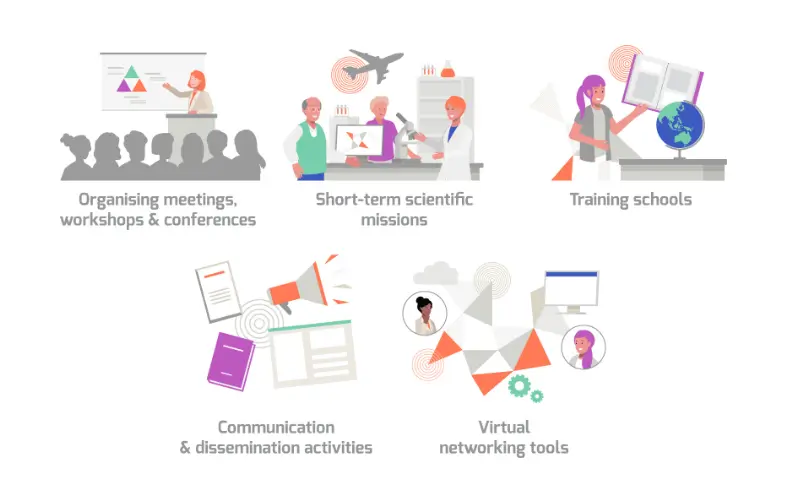Funding networking activities
European Cooperation in Science and Technology (COST) creates open spaces where people and ideas can grow.
COST funds interdisciplinary research networks called COST Actions. These Actions bring together researchers, innovators and other professionals including industry specialists, who are based in Europe and beyond, to collaborate on research topics for a period of 4 years.
The budget
The funding a COST Action receives covers the expenses of networking activities rather than research. As such is used to organise and fund events, Short-term Scientific Missions, Training Schools, communication activities, grants to attend interesting international conferences, and virtual networking tools.
An estimated €125,000 is made available for a COST Action in its first year and €150,000 per year for the other three (variable depending on the number of COST Countries represented in the Working Groups).
Benefits
Participation in COST Actions has led to significant results and follow-up in terms of the number of proposals submitted for collaborative research in Framework Programmes, with a success rate which more than triple the average success rates for these programmes (39% success rate). By funding networking, COST acts as a pre-portal for further research and innovation funding such as Horizon Europe, the European Union’s Framework Programme for Research and Innovation.

Funding research networking through COST Actions translate to many other diverse benefits for researchers and for the R&I sector more broadly. These include:
Scientific

- enabling researchers to work on emerging scientific topics
- facilitating access to research infrastructures (through short-term scientific missions)
- fostering opportunities for training
- maximising the production of new knowledge and breakthrough discoveries
Networking

- creating open spaces for the free circulation of researchers and ideas
- helping advancing knowledge and innovation (by building an internal market for researchers and innovators)
- increasing interconnectedness with the whole research community across countries, generations, and gender in Europe and beyond
- promoting global research cooperation and widening access to excellence
Mobility and visibility

- stimulating international mobility and visibility
- generating short-term mobility with long-term impact
Career opportunities

- acting as incentive for the promotion of career development at European level
- boosting careers of Young Researchers and innovators
Financial support

- allowing a low-entry barrier and successful pathways towards other cooperation schemes in the ERA
Who can participate?
COST Actions attract researchers and innovators from universities, as well as from public and private institutions, NGOs, industry and SMEs – all institutions are welcome. Participants can apply at any stage of their career.
COST Actions are based on the principle of inclusivity and actively promote the participation of researchers and innovators based in less-research-intensive COST Member countries.
